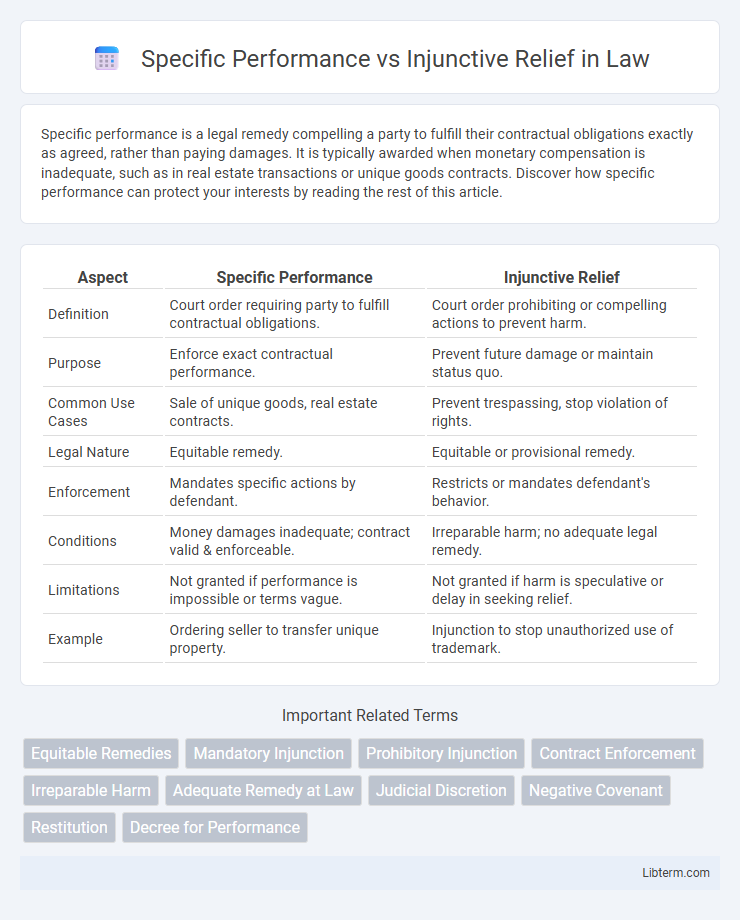Specific performance is a legal remedy compelling a party to fulfill their contractual obligations exactly as agreed, rather than paying damages. It is typically awarded when monetary compensation is inadequate, such as in real estate transactions or unique goods contracts. Discover how specific performance can protect your interests by reading the rest of this article.
Table of Comparison
| Aspect | Specific Performance | Injunctive Relief |
|---|---|---|
| Definition | Court order requiring party to fulfill contractual obligations. | Court order prohibiting or compelling actions to prevent harm. |
| Purpose | Enforce exact contractual performance. | Prevent future damage or maintain status quo. |
| Common Use Cases | Sale of unique goods, real estate contracts. | Prevent trespassing, stop violation of rights. |
| Legal Nature | Equitable remedy. | Equitable or provisional remedy. |
| Enforcement | Mandates specific actions by defendant. | Restricts or mandates defendant's behavior. |
| Conditions | Money damages inadequate; contract valid & enforceable. | Irreparable harm; no adequate legal remedy. |
| Limitations | Not granted if performance is impossible or terms vague. | Not granted if harm is speculative or delay in seeking relief. |
| Example | Ordering seller to transfer unique property. | Injunction to stop unauthorized use of trademark. |
Introduction to Equitable Remedies in Contract Law
Equitable remedies in contract law provide judicial solutions when monetary damages are insufficient to address breaches. Specific performance mandates the breaching party to fulfill contractual obligations as agreed, commonly used in cases involving unique goods or real estate. Injunctive relief prevents a party from engaging in actions that would cause irreparable harm, often applied to protect confidentiality or enforce non-compete clauses.
Defining Specific Performance: Key Concepts
Specific performance is a judicial remedy compelling a party to fulfill their contractual obligations rather than paying damages. It is typically applied in cases involving unique goods or property, such as real estate, where monetary compensation is insufficient. Unlike injunctive relief that primarily prohibits actions, specific performance mandates affirmative action to complete the contract terms.
Understanding Injunctive Relief: Types and Examples
Injunctive relief is a court-ordered remedy that requires a party to do or refrain from specific acts to prevent harm or preserve rights. The main types of injunctive relief include prohibitory injunctions, which stop a party from performing an action, mandatory injunctions, which compel a party to take a specific action, and interim or interlocutory injunctions granted temporarily during litigation. Examples include restraining a company from using trade secrets, requiring a landlord to maintain property conditions, or preventing the sale of disputed assets.
Core Differences Between Specific Performance and Injunctive Relief
Specific Performance compels a party to fulfill contractual obligations, primarily used when monetary damages are inadequate, such as in real estate transactions. Injunctive Relief, on the other hand, directs a party to either perform or cease specific actions to prevent ongoing or imminent harm, commonly applied in cases involving intellectual property or harassment. The key difference lies in Specific Performance enforcing positive action while Injunctive Relief restrains or prohibits conduct.
Legal Criteria for Granting Specific Performance
Specific performance is granted when damages are inadequate to remedy a breach, particularly in contracts involving unique goods or real estate. Courts require a clear, definite contract, mutuality of performance, and the feasibility of enforcement without extensive supervision. Injunctive relief, in contrast, primarily aims to prevent harm or preserve the status quo rather than enforce contract terms.
When Courts Prefer Injunctive Relief Over Specific Performance
Courts typically prefer injunctive relief over specific performance when the breach involves ongoing or anticipated actions that need to be stopped rather than specific actions to be compelled. Injunctive relief is favored in cases of intellectual property disputes, real estate trespass, or when performance would require constant judicial supervision. This form of remedy prevents irreparable harm by prohibiting misconduct directly, whereas specific performance obligates the completion of a contract under precise terms.
Common Scenarios: Specific Performance in Practice
Specific performance is commonly applied in real estate transactions where the unique nature of property makes monetary damages inadequate, compelling courts to enforce contract fulfillment. It is also prevalent in contracts for rare or unique goods, such as art or custom-made items, where the seller must deliver the exact item agreed upon. Unlike injunctive relief, which prohibits actions, specific performance mandates affirmative action to honor the terms of a contract.
Typical Uses of Injunctive Relief in Legal Disputes
Injunctive relief is commonly employed to prevent ongoing or imminent harm by ordering a party to do or refrain from specific actions, especially in cases involving intellectual property disputes, breach of confidentiality, or property trespass. Courts often grant preliminary or permanent injunctions to maintain the status quo and avoid irreparable damage that monetary damages cannot adequately address. Typical uses include stopping the unauthorized use of trademarks, enforcing non-compete agreements, and halting environmental violations.
Advantages and Limitations of Each Remedy
Specific performance enforces the exact terms of a contract, offering a powerful remedy when monetary damages are inadequate, particularly in real estate or unique goods cases, but it may be limited by judicial discretion and the impracticality of supervision. Injunctive relief prevents ongoing or imminent harm by compelling or restraining actions, proving effective in protecting proprietary rights or preventing breaches, yet its temporary nature and potential for limited scope can restrict long-term resolution. Both remedies play crucial roles in equity, balancing enforceability and practicality, with specific performance emphasizing fulfillment and injunctive relief focusing on prevention.
Choosing the Appropriate Remedy: Factors to Consider
Choosing between specific performance and injunctive relief hinges on the nature of the contractual obligation and the feasibility of enforcement. Specific performance is favored when the subject matter is unique, such as real estate or rare goods, making monetary damages inadequate. Injunctive relief is preferable when preventing a party's harmful actions or maintaining the status quo is necessary, especially in intellectual property disputes or ongoing contractual relationships.
Specific Performance Infographic

 libterm.com
libterm.com